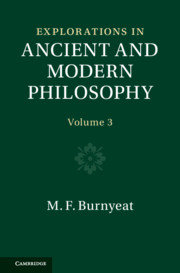Book contents
- Explorations in Ancient and Modern Philosophy
- Explorations in Ancient and Modern Philosophy
- Copyright page
- Contents
- Illustrations
- Preface
- Acknowledgements
- Abbreviations
- Introduction
- Part I The Republic
- Part II The past in the present
- Chapter 9 Plato
- Chapter 10 James Mill on Thomas Taylor’s Plato: Introduction
- Chapter 11 What was ‘the common arrangement’? An Inquiry into John Stuart Mill’s boyhood reading of Plato
- Chapter 12 The past in the present: Plato as educator of nineteenth-century Britain
- Appendix: The archaeology of feeling
- Bibliography
- Index locorum
Chapter 12 - The past in the present: Plato as educator of nineteenth-century Britain
from Part II - The past in the present
Published online by Cambridge University Press: 24 March 2022
- Explorations in Ancient and Modern Philosophy
- Explorations in Ancient and Modern Philosophy
- Copyright page
- Contents
- Illustrations
- Preface
- Acknowledgements
- Abbreviations
- Introduction
- Part I The Republic
- Part II The past in the present
- Chapter 9 Plato
- Chapter 10 James Mill on Thomas Taylor’s Plato: Introduction
- Chapter 11 What was ‘the common arrangement’? An Inquiry into John Stuart Mill’s boyhood reading of Plato
- Chapter 12 The past in the present: Plato as educator of nineteenth-century Britain
- Appendix: The archaeology of feeling
- Bibliography
- Index locorum
Summary
This chapter offers an account of the inspiration for their active advocacy of political, social, and educational reform that three key figures of the British nineteenth century found in Plato: John Stuart Mill, George Grote (author of the classic three-volume study Plato of 1865), and Benjamin Jowett (whose translation of the entire Platonic corpus of 1871 was to be hugely influential). For both Mill and Grote, the importance of the probing Socratic method portrayed in the dialogues was paramount. Grote contrasted it with the tyranny exercised over the dissenting individual by the conformism of society at large: what he called King Nomos, with his eye particularly on the Great Speech Plato puts in Protagoras’s mouth in the Protagoras. To his mind, the Republic represented a sad betrayal of the Socratic spirit. It was Jowett who was chiefly responsible for making that dialogue’s moral idealism central to the education Oxford provided for the nation’s future elite, and whose endorsement of its radical proposals for equality for women in education and in politics is particularly notable.
- Type
- Chapter
- Information
- Explorations in Ancient and Modern Philosophy , pp. 306 - 328Publisher: Cambridge University PressPrint publication year: 2022

